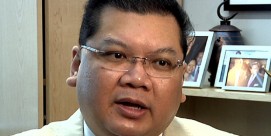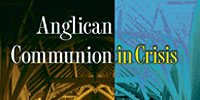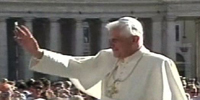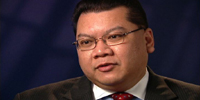Web Exclusive: “Who Do Men Say That I Am?”
The Key to the Keeper of the Keys
by J. Peter Pham
In 1316, after the tumultuous papacy of Pope Clement V, the cardinals of the Catholic Church elected an elderly French colleague serving in the Roman Curia, Jacques DuËse, who took the name John XXII. Although his advanced age — he was seventy-two years old when elected — predicted a transitional papacy, John took to his new office with almost miraculous energy and went on to occupy the papal throne for some eighteen years, during which time he not only reorganized the church’s central bureaucracy and strengthened the powers of his office by removing the election of bishops from cathedral chapters, but also intervened in a number of theological controversies, including the one between the Conventual and Spiritual Franciscans, ultimately excommunicating the latter, including the most famous of their number, the philosopher William of Occam.
But John XXII is perhaps best known for being one of the few popes — and the only one in times recent enough for an accurate record to be extant — to stand accused of heresy. In a series of sermons he undertook to preach between All Saints Day 1331 and the Feast of the Annunciation 1332, Pope John expounded his conviction that the saints do not see God until the day of final judgment, contradicting the traditional doctrine that they enjoyed the “Beatific Vision” immediately after death. He also speculated that devils and the souls of the damned were likewise not yet in hell (since they, like the saints, had to await the Judgment Day).
In an age in which such obscure theological disputations were followed as passionately as the culture wars are today, the pontiff’s musings provoked outrage, as theologians at major universities leaped to condemn his views and a number of his cardinals began planning a council to depose him for straying from the path of orthodoxy. Ultimately, under extraordinary pressure and on his deathbed, John gave in to his critics and professed his belief that the saints see God “as their condition allowed,” insisting that, in any event, his theologizing was an academic exercise undertaken in his purely personal capacity rather than an expression of papal teaching.
John’s convenient distinction between his personal theological inquiry and his official position became an increasingly difficult one to maintain as the claims of papal infallibility expanded over the centuries that followed. His successors managed it by refraining from expressing personal theological opinions and limiting their doctrinal pronouncements to official declarations. The late Pope John Paul II, however, partially reopened the issue with the “catechisms” he delivered at his weekly Wednesday audiences as well as the books he published after his election to the papacy. But while the Polish pontiff’s literary efforts consisted primarily of semi-autobiographical personal reflections, with the publication of JESUS OF NAZARETH (Doubleday, 2007) by his German successor, Benedict XVI, for the first time in nearly seven centuries the world is confronted with systematic work by a theologian who is simultaneously, in Catholic belief, the custodian of the faith and the keeper of the keys originally entrusted by Jesus to the Galilean fisherman Simon Peter.
An academic theologian — indeed, the first to be elected to the papacy since Pius VII in 1800 — Benedict already has to his credit a distinguished list of publications so extensive that they could be fairly reckoned a respectable accomplishment for several scholars. In his volume TRUTH AND TOLERANCE (Ignatius Press, 2004) — a book-length response to the uproar caused at the publication by the Congregation for the Doctrine of the Faith, which he headed at the time, of the declaration DOMINUS IESUS, affirming the absolute universal claims of Christianity in general (and Catholicism in particular) vis-ý-vis other religions — then Cardinal Joseph Ratzinger surveyed his own considerable body of work and pronounced it “quite fragmentary and unfinished.” Hence the urgency that has motivated him to devote “every free moment” since his election to the papacy to finish a book he described as having has “a long gestation.” That same urgency — “I do not know how much more time or strength I am still to be given,” the eighty-year-old author writes — results in JESUS OF NAZARETH being just the first ten chapters of what is projected to be a longer work. It covers a narrow period in its subject’s public career, extending from his baptism in the Jordan by John the Baptist to Peter’s confession of faith and the Transfiguration.
The book takes as its starting point the author’s observation over the course of his career that “the gap between the ‘historical Jesus’ and the ‘Christ of faith’ grew wider and wider and the two visibly fell apart.” This distinction, first raised by critical biblical exegetes such as Adolf von Harnack (1851-1930), who helped pioneer the liberal Social Gospel movement, “has by now penetrated deeply into the mind of the Christian people at large” and to no good effect, according to Benedict, who asks: “[W]hat can faith in Jesus the Christ possibly meanÖif the man Jesus was so completely different from the picture that the Evangelists painted of him and that the Church, on the evidence of the Gospels, takes as the basis of her preaching?”
An example of Benedict’s own preferred methodology is found in his treatment of the baptism of Jesus. He dismisses as “more akin to a ‘Jesus novel'” than an actual interpretation of the gospel texts the broad consensus of modern interpretation of the event that presents it as a “vocational experience” whereby Jesus, after having lived a relatively ordinary existence is, at the moment of his baptism by John, made “aware of his special relationship to God and his religious mission,” which “supposedly originated from the expectational motif then dominant in Israel.” The texts, according to Benedict, “give us no window into Jesus’ inner life” because “Jesus stands above our psychologizing.” Instead, carefully read in the light of the entirety of the canon of scripture as a whole and the living tradition of the church (Benedict cites extensively the liturgies of the Eastern churches and their theology of icons, as well as the Roman liturgy), they “enable us to ascertain how Jesus is connected with ‘Moses and the Prophets’; they do enable us to recognize the intrinsic unity of the trajectory stretching from the first moment of his life to the Cross and the Resurrection.”
As JESUS OF NAZARETH unfolds, it is clear that its author has little patience for popular modern Christologies portraying Jesus as wise teacher on a par with the founders of other religious or philosophical movements, or as a preacher of tolerance and understanding, or even as a political revolutionary. No wonder the Congregation for the Doctrine of the Faith under Cardinal Ratzinger investigated the Christological writings of Jesuit theologians Jacques Dupuis and Roger Haight and more recently issued a warning about those of another Jesuit, Jon Sobrino, who in its view transgressed into those respective faulty understandings. (In the interest of full disclosure, I was a student of Dupuis, whose official defender during Ratzinger’s intervention, Gerard O’Collins, directed the dissertation for my theological doctorate.) For Benedict, however, the flaw with all these interpretations is that, no matter how well-intentioned, they end up detracting from the truth that “in the end, man needs just one thing, in which everything else is included,” God, the source of objective, absolute truth beyond the ephemeral interests and fancies of humankind.
Thus, in his exegesis of Jesus’ temptations in the desert when he was called upon to “command this stone to become bread” (Luke 4:3), Benedict admits, “Is there anything more tragic, is there anything more opposed to belief in the existence of a good God and a Redeemer of mankind, than world hunger?” In answer to his own query, he quotes the German Jesuit priest Alfred Delp, who was executed by the Nazis for his work with the German resistance: “Bread is important, freedom is more important, but most important of all is unbroken fidelity and faithful adoration.” Benedict then proceeds to draw out the practical implications of this theological perspective on feeding the world today:
The aid offered by the West to developing countries has been purely technically and materially based, and not only has left God out of the picture, but has driven men away from God. And this aid, proudly claiming to “know better,” is itself what first turned the “third world” into what we mean today by that term. It has thrust aside indigenous religious, ethical, and social structures and filled the resulting vacuum with its technocratic mind-set. The idea was that we could turn our stones into bread; instead, our “aid” has only given stones in place of bread. The issue is the primacy of God. The issue is acknowledging the he is a reality, that he is the reality without which nothing else can be good. History cannot be detached from God and then run smoothly on purely material lines.
The limitations of international development assistance are nowadays well known: witness the devastating critique by William Easterly, the subtitle of whose most recent book THE WHITE MAN’S BURDEN (Penguin, 2006) was “Why the West’s Efforts to Aid the Rest Have Done So Much Ill and So Little Good.” What is characteristic of Benedict is his emphasis, echoing his repeated calls for postmodern Europe to recover its Christian roots, that in this world “we are obliged to resist the delusions of false philosophies and to recognize that we do not live by bread alone, but first and foremost by obedience to God’s word.” Only when this obedience is put into practice, Benedict insists, will “the attitude develop that is also capable of providing bread for all.” Thus the reason for the pontiff’s emphasis on Christology (and its role as the hermeneutical key to his own “fragmentary and unfinished” theological corpus):
What did Jesus actually bring, if not world peace, universal prosperity, and a better world? …He brought God, and now we know his face, now we can call upon him. Now we know the path that we human beings have to take in this world. Jesus has brought God and with God the truth about our origin and destiny: faith, hope, and love.
Unlike his fourteenth-century predecessor, Benedict’s theological treatise comes with a proviso: “It goes without saying that this book is in no way an exercise of the magisterium, but is solely an expression of my personal search ‘for the face of the Lord’ÖEveryone is free, then, to contradict me.” No doubt a number of theologians, both Catholic and non-Catholic, will dispute one or another of the scholarly preferences of the author (for example, JESUS OF NAZARETH takes issue with the influential commentaries of the Gospel of John by well-known theologians such as Rudolf Bultmann and Martin Hengel, while favorably citing less well-known figures such as Protestant biblical scholar Peter Stuhlmacher, a onetime colleague of Joseph Ratzinger’s at the University of T¸bingen, who holds that “the Johannine school carried on the style and thinking and teaching that before Easter set the tone of Jesus’ internal didactic discourses with Peter, James, and John”– a distinctly minority view in academic circles).
The real question, however, is not what professional theologians think but whether anyone else in today’s world will take up Benedict’s invitation to engage in dialogue. The answer to that query might well determine whether or not another seven centuries will have to pass before another Bishop of Rome takes up his pen to open an intellectual debate.
J. Peter Pham, director of the Nelson Institute for International and Public Affairs at James Madison University in Virginia, is the author, among other works, of HEIRS OF THE FISHERMAN: BEHIND THE SCENES OF PAPAL DEATH AND SUCCESSION (Oxford University Press, 2006).






